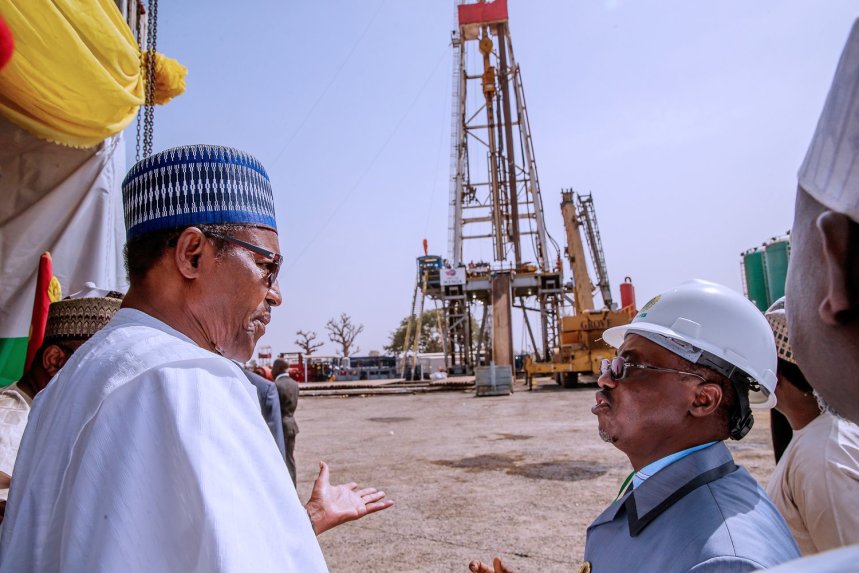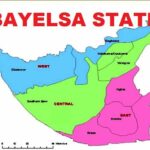President Muhammadu Buhari flagged off the drilling of crude oil at Kolmani, a border area between Gombe and Bauchi states, on November 22. The North has at last made it. The long search for the precious commodity that began in the Lake Chad area many years ago, has yielded the desired result, not in the Lake Chad area but in Gombe/Bauchi states. Kogi in the north-central geo-political zone, has been admitted into the club of oil producing states. As a Daily Times headline once put it many years ago when northerners were trickling into the federal public service in Lagos, “the mallams are coming.” Or, in this case, the north is coming.
Kolmani has also thrown up further challenges in prospecting for crude oil in other parts of the north such as the north-west. The continuing search in the Benue trough and Anambra raises hopes that in addition to the long stretches of arable land, Nigeria sits on as large oil reserves as say Saudi Arabia. See how incredibly generous nature is to our country? It is not just exciting, it is exhilarating.
The discovery of crude oil in the North is a major economic, political, and social development in the country. Its ramifications are far more than we can reasonably fathom at this point in the process of exploiting the over one billion barrels of oil reserves and 500 billion cubic feet of gas at Kolmani.
President Muhammadu Buhari has every reason to be proud of this bright spot in his management of the national government. We have every reason to congratulate him and share this moment of personal and national pride with him. The president made an important point at the flag-off when he said that “It is…to the credit of this administration that a time when there is near zero appetites for investment in fossil energy, coupled with the local challenges, we are able to attract investment of over USD 3 billion to the project.”
Taming the tide of zoonotic diseases in Nigeria
Between selfish interest and selfless communal goal
Indeed. The challenges of protecting this huge investment must not be lost on the government. Investors are risk takers, but they do not take particular pride in walking where angels fear to tread. It is the duty of the Nigerian state to reciprocate their decision to take the risk at this point in our country by making sure that the oil fields and the personnel are safe.
It should be easy to appreciate the implications of the north as an oil producing area in the country. One, it will change the national narrative in a most dramatic way. The oil-producing parts of the country have always described the north as a parasite on the national economy. It feeds on what other parts of the country either produce or are blessed with but has the arrogance not to show gratitude to the south for pig-backing it. With Kolmani, that narrative is about to change. The north will be a parasite no more. It will bring into the distributive pool as much petro-dollars as the south.
Two, there will be a balance of wealth between the north and the south. This will obviously moderate the current separatist agitations, senseless at best, to unravel the work of Lord Lugard because the north which contributes zilch to the national economy, chops more than the areas that contribute the most to it in terms of national leadership and wealth distribution. Crude oil is the goose that lays all the golden eggs in our national development. We do not seem to reckon that much with agriculture any more as a major partner with oil in the shape and the size of the national economy.
Three, with more and more northern states becoming oil producing states, the lingering national agitation for resource control will inch back from the back burner to the front burner. But it is not likely to be promoted by its hitherto most strident promoters because much of the narrative will have been changed by the balance of wealth. The dark intention behind that agitation is that with the north not being an oil producing area of the country, if the oil producing areas control their resources, the north as a parasite, will starve. If the north produces crude oil, it will no longer be a parasite. The resource control agitation might be denied its greatest promotional weapon – emotionalism. I expect a change in the resource control narrative.
But before we get carried away with the prospects of our country being truly awash with crude oil wealth from the north and the south, we must be mindful of the curse of crude oil. Turning oil into a blessing should be the new national objective with Kolmani coming on stream. We need to spare some serious thoughts for the unanticipated implications of this development. One, the north is the food basket of the nation. The basket has become increasingly empty, thanks to state neglect coupled with bandit attacks on the peasant farmers. Matters could get worse in food production for the country because crude oil promises easy wealth.
You cannot stop Gombe and Bauchi peasant farmers from abandoning whatever is left of their peasant holdings from bandit attacks and flocking to the new oil fields as part of the new wealth seekers attracted by the bright lights of crude oil wealth.
Two, in the management of our national economy over the years, we have tended to put all our eggs in the crude oil basket and, despite promises by our successive leaders to diversify the economy by lifting up agriculture, nothing has dramatically changed. Agriculture is still condemned to the side lines because money from agriculture comes with labour, sweat and even tears. Banditry and kidnapping of peasant farmers in many parts of the north, have made agriculture a dangerous undertaking.
Crude oil is great, but no one drinks crude oil to survive. People eat food to survive. Let us not forget that our greatest asset as a nation lies in our ability to feed ourselves. A nation that cannot feed itself lays but a tenuous claim on its true independence.
Our need to balance the oil economy with improved agricultural economy has generated more verbiage and less action. The result is the continued impoverishment of peasant farmers, who, with their small holdings, are still able to put food on our tables. The National Bureau of Statistics, NBS, last week released the disturbing news that the number of the poor in the country has risen to a bone-chilling 133 million people. The burden of this on the Nigerian state is not just heavy; it is crushing.
It is a fair guess that between 80 and 90 per cent of this chilling number are peasant farmers. The challenge before the Nigerian state is not to grow more and more poor people., even as crude oil gushes from southern and northern oil fields. It is to make the number of the poor progressively fewer and eventually make this nation live the true meaning of its human and resource endowments and potentials: a great and wealthy nation.

 Join Daily Trust WhatsApp Community For Quick Access To News and Happenings Around You.
Join Daily Trust WhatsApp Community For Quick Access To News and Happenings Around You.

